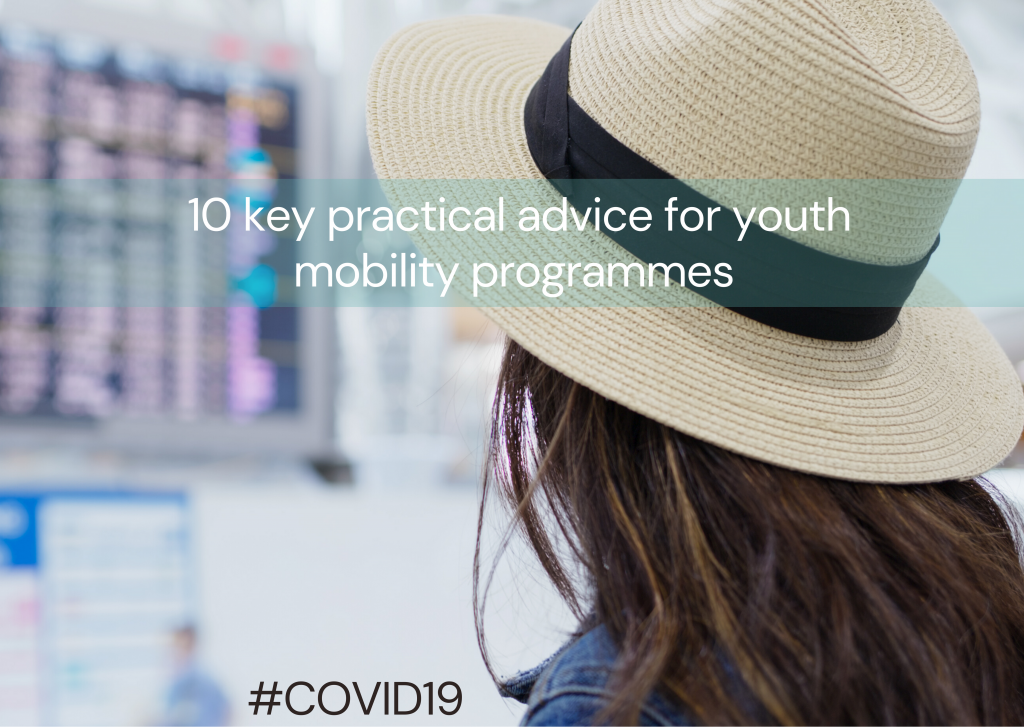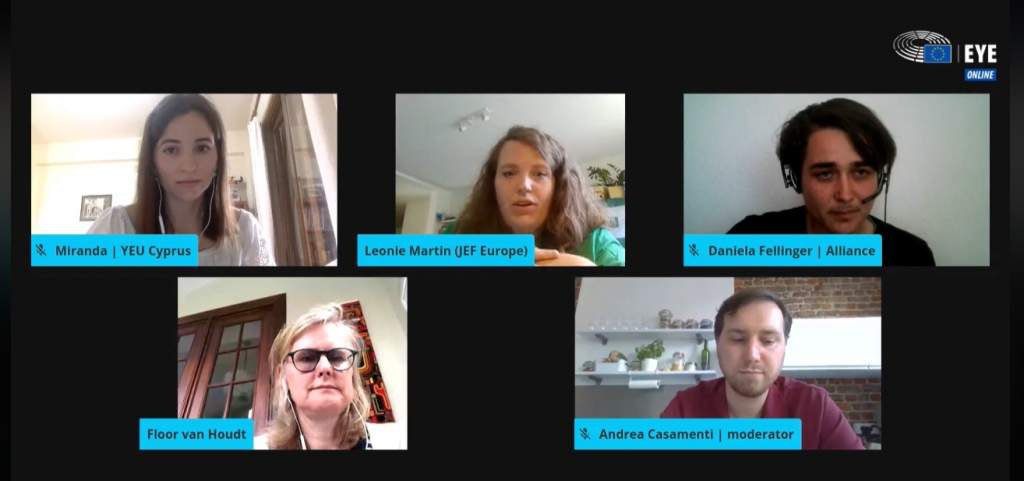 Share this!
Share this!The European Youth Event (EYE2020) is a major event at the European Parliament (EP) aiming to stimulate and involve active citizenship amongst young Europeans. It takes place every two years, but unfortunately, this year has been postponed due to the ongoing COVID-19 outbreak.
In its stead, the European Parliament has organised a special online edition, with a variety of activities in digital format!
On the 26 May 2020, a webinar on the impact of the COVID-19 on youth mobility was held. A very topical issue, considering that since the start of the crisis international mobility exchanges haven been completely stopped. Several mobility programmes have been suspended or have had to strictly adapt to the continuously changing conditions. Eurodyssey, AER’s youth mobility programme has not been exempt from this wave.
Youth mobility was severely disrupted by the borders closures and by governmentally imposed travel bans. The sweeping measures to curb COVID19 left a very low margin to reinvent mobility, however, new forms arise thanks to the myriad opportunities that technology offers us.
The speakers included: Leonie Martin, President of JEF Europe; Miranda Zavrou, Secretary of Events at YEU Cyprus; Floor van Houdt, Head of Unit, DG EAC, European Commission; Daniela Fellinger, Coordinator, Development Committee Alliance of European Voluntary Service Organisations moderated by Andrea Casamenti, Board Member of the European Youth Forum. They reflected on different approaches to mobility in times of COVID-19 and shared some good examples.
Miranda pointed out that one of the very practical problems they faced, when mobility is still possible, is the increased price in flight tickets. In fact, what characterises this period for mobility is the high degree of uncertainty. This uncertainty leads to frustration for many volunteers and participants active in mobility programs, dividing them into two categories: on the one hand, those who want to return home and, on the other hand, those who do not want to give up the experience. So it is important to balance these different needs. She also highlighted the potential of digital tools, as, despite their sceptical first thought in moving workshops in an online mode, in the end, they reached even more people and increased the audience diversity.
Explore the full potential of digital tools!
Daniela stressed out the problem of the administration costs for the managing organisations following the cancellation or postponement of the mobility programmes. Despite projects being suspended, the costs derived from assisting the participants stuck abroad in mobility persist or become even higher. It is therefore important to prevent any cut of the funding available to mitigate such costs. She also expressed the positive impact of the digital tools on their programme “Work Camps” they turned it out to an online version to keep the intercultural exchange. As a result, they got an unexpected amount of responsiveness from different organisations.

Leonie drew attention on the importance of assessing whether the affected project can be turned out in an online version at the very initial step of the activity planning. She also raised concerns about the difficulties in stimulating the European identity in this context.
On this point, Floor briefly presented what the DG for Education and Culture has done to respond to these uncertain scenarios. First of all, they implement the maximum flexibility possible in the framework of the program and the legal normative. For instance, guidance to Erasmus+ National Agencies was issued in order for the actors concerned to invoke the “force majeure” clauses. This also allows to prevent additional costs up and postpone the planned activities by up to 12 months.
Leonie suggested to the organisations in charge of mobility programs to invest in software that can allow further interaction between mobility stakeholders in view of the post-COVID 19 scenarios. Daniela presented a good practice of speedy information exchange as regards the measures implemented in the different countries within the network of the Alliance. She also spotlighted that one of the things they learned from this situation is that uncertainties can lead to creativity. Floor agreed on this point and underlined that young people are widely known for being a source of creativity.
Lessons for the future …
Miranda agreed on the need to learn from the situation and expressed satisfaction for having transformed some threats into learning opportunities. In the future, she suggests adopting a risk management approach to ensure resilience and flexibility when planning activities. It is also very important to exploit the full potential of digital tools by investing in innovative methodologies. Another key point for the post-COVID19 is to consider using more blended activities in mobility in order to better combine online with offline methodologies.
Daniela warned about the pros and cons of online activities. On the positive side, you can include more disadvantaged youth who live in remote areas. By contrast, it is more difficult to keep them motivated and active from the distance.
Floor furthered developped this point stating that it is key to acknowledge that not all young people have universal access to digital tools and devices. The European Commission is working in this direction to allow for wider access to digital platforms.
See below a practical guide with 10 tips for mobility programmes downloadable HERE.
